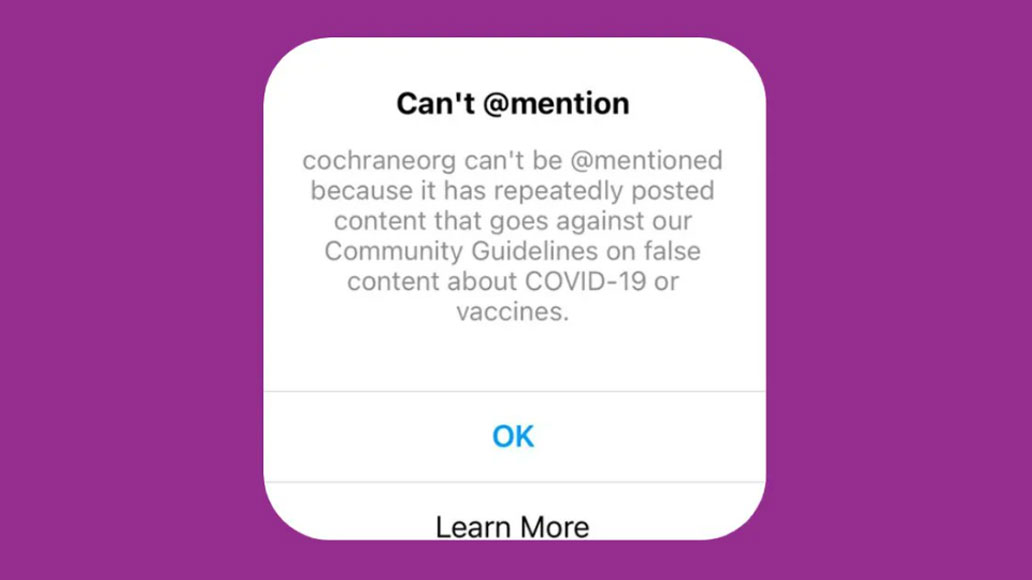The Cochrane Organisation is responsible for the publication of meta analyses and systematic reviews to help doctors and patients make informed choices about health. They are considered by many to be the gold standard in scientific and health evidence. On Wednesday they were unceremoniously shadow banned by Instagram. Anyone wishing to tag the organisation’s account in their posts was greeted with a warning message, declaring that they had “repeatedly posted content that goes against our community guidelines on false content about COVID-19 or vaccines”.
This is a surprising turn of events, given that, for years, the literature produced by the Cochrane Organisation has been considered an authority in medical evidence. Each systemic review considers the findings of many studies and trials, and a well done review is often considered “level 1” evidence — the best of the best. Such reviews feed into guidelines issued by national and international organisations such as NICE, and have significant impacts on NHS policies. What happened?
The Cochrane ban marks the latest in a long line of tech censorship, which has seen accounts suspended, shadow banned and removed. All in an attempt to fight disinformation relating to the Covid 19 pandemic.
It is important that false information cannot be spread with impunity. We live in an interconnected world, and false anti-vaxx propaganda can result in significant harm. But who decides what is disinformation and what isn’t? Shouldn’t we be concerned that Instagram, Twitter and Facebook have determined themselves to be the arbiters of scientific truth, simply because of the platforms they own? Tech companies have responded to the pandemic by taking the opportunity to implement a policy of enthusiastic and heavy handed censorship. Shadow banning the Cochrane Organisation is just another step in a strategy which has even seen cardiologists censored for discussing vaccine-related myocarditis.
Science is a process, and scientific discovery means that beliefs change. We have seen this many times throughout the pandemic. Most will remember the WHO’s statements in March 2020 — against wearing facemasks, unless sick or caring for someone sick. It is a statement that, if written now, would likely get them banned from social media.
Some argue that such censorship is a positive step, but those demanding more tech restriction and paternalism should realise it may be harming more than it helps. Not only does heavy handed censorship by social media companies contravene free speech, and cut down on legitimate discussion, it is also counterproductive.
Whilst it may be reasonable to limit patently untrue statements, cracking down on rapidly-changing positions, and denying ambiguity where it exists, only serves to drive people to more extreme beliefs. Conspiracy theories capitalise on uncertainty, and mistrust in authorities. What better way to sew seeds of mistrust than to refuse to permit any debate, and to fail to admit when evidence is sparse, or policies mutable? If the aim is to cut down on conspiracies and disinformation, far better to allow discussion and debate, and to be open and honest about the information we do have, including the shortcomings and the limitations.










Join the discussion
Join like minded readers that support our journalism by becoming a paid subscriber
To join the discussion in the comments, become a paid subscriber.
Join like minded readers that support our journalism, read unlimited articles and enjoy other subscriber-only benefits.
Subscribe